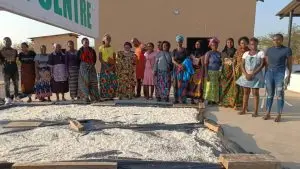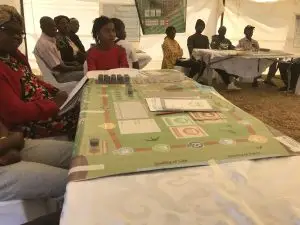ENABLE-TAAT in Zambia
ENABLE-TAAT activities in Zambia are executed through Zambia Youth Agripreneurs (ZYA) in collaboration with youth associations across the country. Established in 2016 under the ENABLE Youth project, ZYA aims to create sustainable employment for rural youths by engaging them in agricultural value chains, addressing high youth unemployment rates. ZYA has about eight active youth groups in Lusaka, Central, Western, and Southern provinces, each with 15 to 30 members aged 20 to 35. ZYA assists these groups in formalizing their businesses when necessary.
ENABLE-TAAT uses a Training of Trainers (ToT) approach for agribusiness activities, such as youth incubation programs. After up to 12 months of incubation, group representatives return to train other members, transferring the skills they acquired. ENABLE-TAAT also addresses gender inequality by partnering with Zambia Women in Agricultural Research and Development (ZaWARD) and the Stirring Steam 4 Stem (SSS) project to encourage women’s participation.
IITA’s youth empowerment strategy, based on the Agripreneur movement started a decade ago, provides a business-oriented, youth-led empowerment model focused on experiential learning and entrepreneurship. The ENABLE-TAAT Project in Zambia operates through four main activities: Advocacy, Capacity Development, Food Basket (Nutritional Outreach), and Agribusiness Parks.
Advocacy: This involves collaboration with other youth empowerment projects and government initiatives, documenting and showcasing youths’ achievements, and participating in youth forums. For instance, ENABLE-TAAT Youth Trainees exhibited modern technologies at a ZARI event attended by President Edgar C. Lungu on March 14, 2021. Advocacy activities have reached over 500 youths, equipping them with technical skills in various agricultural value chains and encouraging them to start their enterprises.
Food Basket – Nutritional Outreach: This activity develops networks of nutritional food basket demonstrations, promoting bio-fortified crops like High Iron Beans, cassava, orange-fleshed sweet potatoes, and soybeans. Demonstrations are conducted in at least five districts annually. For example, in Mkushi, a youth group member planted 2 hectares of orange-fleshed sweet potatoes and 3 hectares of orange maize in the 2020/2021 season. In Monze, youth groups planted 8 hectares of an improved soybean variety. This approach enhances food basket diversity, income security, and nutritional variety.
Capacity Building: ENABLE-TAAT organizes technical and soft skills training for youths, regardless of their educational background, to improve their operations and productivity. Over 100 underemployed and unemployed youths have received training in crop production, aquaculture, poultry, entrepreneurship, and various soft skills. Training includes incubation, mindset change, exploratory visits, continuous mentoring, and technical support.
Agribusiness Parks: These parks offer experiential learning across agricultural value chains. Each park consists of 5-10 youths, who receive incubation and mentorship on agronomic practices and business management from IITA scientists and business experts. Youths operate core businesses in value chains such as cassava, vegetables, maize, soybeans, poultry, and fish farming. ENABLE-TAAT provides ongoing training, technical support, and mentorship for at least 12 months.
Examples of Agribusiness Park activities include:
Aquaculture Agribusiness Parks: Established in Chongwe, Mkushi, and Kaoma to empower youths through the fish value chain. Each location features a standard fish pond (20m x 30m) in partnership with the Fisheries Department. Approximately 50 youths are involved, with notable activities like the June 11, 2021, harvest of 1,500kg of fresh fish in Lusaka.
Poultry Agribusiness Parks: Implemented in Monze and Kaoma for village chicken production. Facilities (8m x 20m) were established, and 50 youths received training in entrepreneurship and poultry production. These enterprises are linked to local schools, supermarkets, and other markets, producing about 50 eggs daily for sale.
Other ENABLE-TAAT activities include:
Horticulture: Empowering youths through quick income-generating gardening activities. In Chongwe and Kaoma, youths produce vegetables like tomatoes and cabbage, supporting the operations of fish and poultry enterprises.
Cassava Production and Value Addition: Youths grow high-yielding cassava varieties and produce products like high-quality cassava flour and chips, supplying chain stores and industrial users. A cassava processing factory in Chongwe serves as a training and commercial facility.
Legume Seed Production: Addressing limited access to improved legume seeds, youths are trained in soybean and cowpea seed production. They produce and sell certified seeds to small seed companies and individual farmers, enhancing local seed supply.
More Zambia Stories

Launch of the National Crop Diversification Strategy: Building a Resilient Future for Agriculture

Empowering Farmers and Youth with Climate-Smart Agriculture and Agribusiness Training

